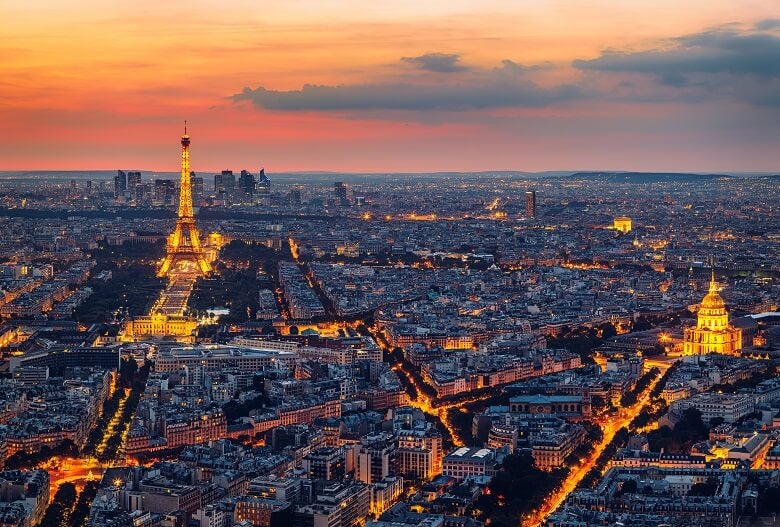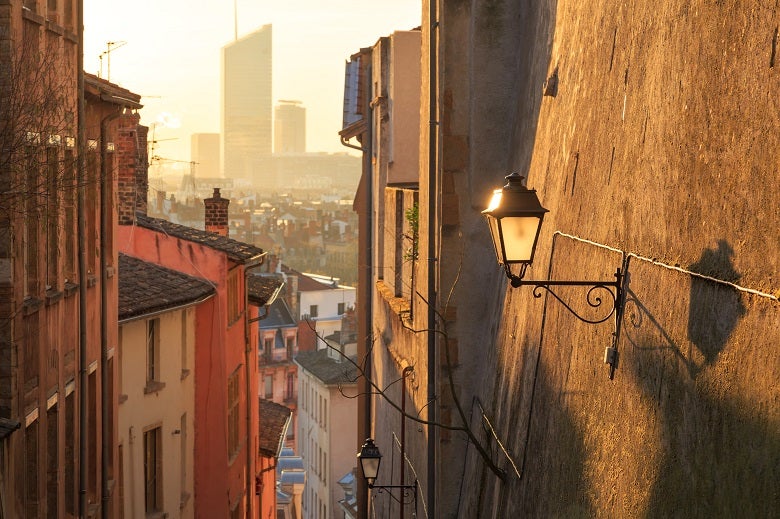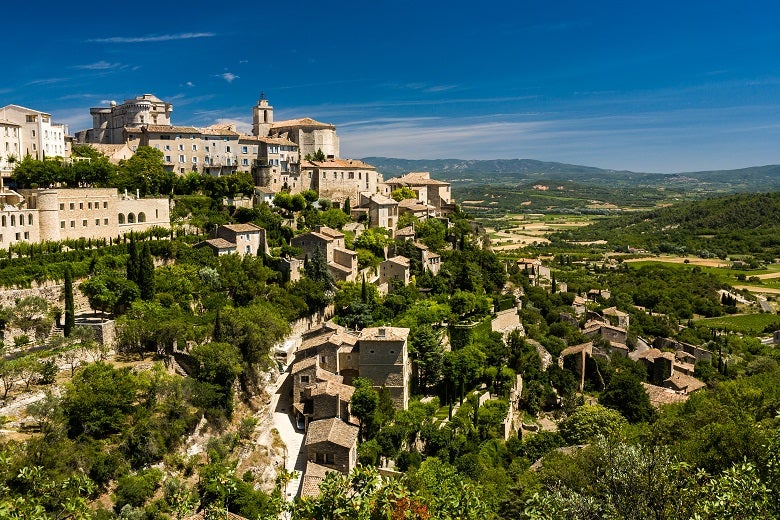7 Best Places to Live in France
Fed up of only being able to indulge in delicious French delicacies whilst on holiday? There’s only one way to overcome this problem – it’s time to start packing!
France is a beautiful country, renowned for its picturesque vineyards and mouth-watering food. It’s a place of history, art, and culture – everything you ask for from a new home.
Being spoilt for choice may not sound like the worst position to be in, but it can often leave you feeling a bit intimidated about moving.
If you’re thinking about moving to France, but are finding yourself stuck about where to actually live, read on – in this guide, we’ll share with you the seven best places to live in France.
Ready to start your move to France? Start the process by filling our easy-to-navigate webform. Tell us where you’re moving to and you’ll be able to compare prices from up to six removal companies.
Select the size of your move to get free quotes
Best Places to Live in France
The seven best places for expats to live in France are: Paris, Brittany, Lyon, Montpellier, Luberon, Dordogne, and Provence. These choices are based on what we think will matter most to those of you that are thinking about moving. Check out the table below for our summary, and read on for further detail!
| City | Reason | |
|---|---|---|
| 1 | Paris | Best for nightlife |
| 2 | Brittany | Best for affordability |
| 3 | Lyon | Best for food and drink |
| 4 | Montpellier | Best for families |
| 5 | Luberon | Best for countryside |
| 6 | Dordogne | Best for retirement |
| 7 | Provence | Best for beaches |
1. Paris
Best for: The Nightlife

A beautiful, burning sunset washing over Paris’ Eiffel Tower
Where better to start than France’s capital?
There’s a reason why Paris is dubbed ‘The City of Lights’ – picture yourself walking through the streets, illuminated by neon lights from endless clubs, filled with hopes about the night ahead.
This beautiful city is famous for a variety of cultural treats: the Eiffel Tower, the Louvre Museum, Pompidou Centre, and so much more. As well as all of this delightful culture, those of you that love the buzz of a night out will be pleased to hear that Paris is the hub of France’s nightlife. And with over 4,316 bars to choose from, you can guarantee there is a little bit of something for everyone.
Students and party-goers will be keen to know that there is an eclectic range of pubs and clubs throughout the city, including such huge names as La Locomotive, Batofar, Chez Castel, and Le Montana. You’re in for the time of your life (if you actually manage to get your foot through the door at these upper tier clubs).
The collection of LGBTQ clubs in Paris is also flourishing. Over time, such venues have been making appearances across the city, but mainly gravitating towards the Marais neighbourhood. Some of the most popular gay and lesbian clubs in and around Paris are:
- Open Cafe – Cafe-style food and weekend brunch until 5pm with happy hour 6-10pm, for the more laid back night out.
- Le So What – A lesbian bar that opens every Thursday, Friday, and Saturday for the public to dance until the early hours of the morning.
- Le Cox – A gay bar that’s open until 2am everyday to dance the night away.
| Pros | Cons |
|---|---|
| The bustling nightlife | Crime rates are higher than most other parts of France |
| Variety of restaurants and shops | Rent prices are high (although not as high as London) |
| A wide range of art, history, and culture | Transport is cheap, but often unreliable |
2. Brittany
Best for: Affordability

Rough waves crashing on a rocky shore in sunny Brittany
Brittany is located in the North West of France, with wonderfully scenic views of rolling hills, bold coastline, and historical towns. Lots of expats move to Brittany for all of these reasons, but for its affordability above all. Brittany is actually labeled as one of the cheapest places to live in France – but, unlike a lot of places, cheap doesn’t necessarily mean low in quality.
With over 700 miles of coastline to enjoy, and endless countryside to take in, Brittany is the peaceful home many of us are searching for. Its ideal location makes the journey home to Britain much less strenuous than from the south of France, and much cheaper too.
House prices in Brittany vary, as they do everywhere. In the likes of Côtes d’Armo (the cheapest area in Brittany) the average house is around €159,000 – almost half of what it is in the UK (£292,924). If you’re picturing a more luxurious life on the coast, many expats decide to renovate old barns that have been abandoned – although this will be much more costly in the long run.
| Pros | Cons |
|---|---|
| Affordable property | The climate is cooler than Southern France |
| Beautiful countryside | In the summer, certain towns can become crowded |
| Lots of history to explore | Lack of big brand high streets for shopping |
Select the size of your move to get free quotes
3. Lyon
Best for: Food and Drink

The dainty, sunlit streets of Lyon
Let’s be honest – wherever you end up in France, you’ll be able to enjoy fantastic food and drink. It’s a nation renowned for its beautiful delicacies, and for us, this was a close call between so many different regions – but if we had to choose a place to live in France based on its food and drink, we would choose Lyon.
What makes Lyon’s food stand out from the rest of France is its cosy and quaint ‘bouchons’. Bouchons are traditional, family-run restaurants that dish up lovely Lyonnais meals, which go back centuries. This French tradition is so valued in Lyon that each year, L’Association de defense des Bouchons Lyonnais certifies those bouchons that meet its standards of authenticity – so you know you’re getting the real deal.
What kind of food can you expect to see on your plate at a bouchon? Well, some dishes may surprise you:
- Grattons (pork scratchings) – This is usually served as a starter, and is seasoned with salt, pepper, and vinegar.
- Lyonnais saveloy (cooked cured sausage) – Although nowadays this is made with pork meat, originally, the primary ingredient for this delicacy was pork brains. Bon appetit!
- Quenelle – This is said to be the epitome of Lyonnaise cuisine. These are dumplings that consist of poultry or fish, which are minced, coated in breadcrumbs, and arranged in the form of a sausage.
You can expect to pass roughly 70 of these cosy eateries around Lyon, but it’s not just bouchons that help Lyon steal the culinary show. There is a huge collection of well-established restaurants and bars throughout Lyon – in fact, as of 2019, Lyon officially has 20 Michelin Star restaurants! You may be thinking about your waistline right about now, but fear not: real traditional Lyonnais food is cooked with fresh ingredients, which are all locally sourced.
| Pros | Cons |
|---|---|
| A huge selection of food and drinks | The crime rate is higher than quieter areas of France |
| A lot of history, art galleries, and museums | There is a shortage of property on the market |
| Good transport links throughout the city |
4. Montpellier
Best for: Families

Montpellier looking radiant at dusk, as the warm sun washes over the city
Choosing where to live is always a daunting prospect, let alone when you have little ones to think of too. If you’re moving to Montpellier, however, this will be the last of your worries.
One of the biggest fears that parents face when moving to a non-English speaking country is their children not being able to pick up the language easily. For Brits, Montpellier’s variety of bilingual schools is one of its more attractive features, as they make it much easier for children to settle in. The most popular schools for English speakers in Montpellier are the International Eridan School, Ecole Privée Bilingue Internationale, and Montpellier Business School.
As well as schooling, Montpellier has grabbed a lot of attention in recent years because of its ever-growing size. This city has so much to offer for families: with museums, art exhibitions, playgrounds, beaches, and botanical gardens. You won’t know where to start.
This rapidly growing city has actually been dubbed as ‘The city of youth’ – nearly half of its residents are aged 30 or younger, including around 80,000 students. The main reason young people are drawn to Montpellier is not just because of the wide variety of clubs, pubs, and beaches – it’s also because of the number of universities and educational institutes it’s home to.
Above all, when moving to a new place, the safety of your children is your priority. Like every city across the world, Montpellier is never 100% safe, and it’s good to have a cautious mind – but overall, it is a very safe area of France. The tramway system is also an efficient method of transportation for any late night adventures you or your children go on, so you can put your mind at rest.
| Pros | Cons |
|---|---|
| All sorts of education opportunities | The property prices can be high |
| Eco-friendly city | Lack of green spaces in the city centre |
| Excellent transport links | The city is small compared to other French cities |
5. Luberon
Best for: The Countryside

Luberon, tucked away in the lusciously green countryside of France
This fairytale-esque area of France is very much in the sticks, but if you find yourself craving a life of tranquility and nature, Luberon is perfect. In fact, as of 2018, it was revealed that France’s rural population only reached 19.5%. Meaning you can look forward to plenty of peace and quiet, with no frustrating over-crowding in your new home.
Not only does this wonderful area have so much history to explore (which dates back to the 10th century), but it has endless trail walks, glistening gorges, and undeniably breathtaking views. If you’ve always dreamt of a simpler life, take the leap and find some peace here.
Although this location is quite isolated from big name brands and high streets, the local markets that run throughout the towns will provide you with all the essentials on your shopping list – wine and cheese being at the top of that list, naturally.
So what can you expect to see at these markets? Well, all of the food is locally sourced, so you can expect a selection of seasonal fruit and vegetables, along with a variety of meat and cheeses, a wide range of wines from the local vineyards, and clothes handmade by people in the different towns and villages.
Unlimited nature also means unlimited sport. You can forget about needing a gym membership – throughout the summer, you’ll have endless sports opportunities, including hiking, kayaking, canoeing, cycling, horse riding, rock climbing, and even a spot of natural swimming.
But what about during the winter? Well, the lucky people of Luberon are less than a two hour drive away from the ski resort, Mont Ventoux. This is a rather small ski resort, but it definitely beats flying across the globe for your next snow fix.
And if all this nature business gets a little too much and you miss the hustle and bustle of city life, then you are just a 40 minute drive away from Avignon, 40 minutes from Aix-en-Provence, and 60 minutes from Marseille.
| Pros | Cons |
|---|---|
| Beautiful countryside | Very isolated |
| Affordable property | Not a huge amount of expats in the area |
| Good connections to larger towns | If you don’t have a car, transport is limited |
6. Dordogne
Best for: Retirement

The peaceful river running through picturesque Dordogne
Beautiful countryside, historical architecture, low property prices, and an endless supply of wine – what more could you ask for? These are just a handful of reasons why so many Brits are choosing Dordogne as their place to retire. Situated in a region of beautiful greenery, this historical region of France provides a slower pace of life that fits perfectly with retirement.
If you’re longing for more than just an abundance of British expats to make you less homesick, many of Dordogne’s architectural features are also quintessentially British. This is why British buyers make up 59% of the population in this region of France.
Like anywhere else in the world, property prices can vary, depending on how much money you have to indulge in. Properties range from simplistic flats to homely cottages, and traditional old farm houses.
Many expats buy an old shell of a farm house for a few thousand pounds, and then renovate it. Although, you’ll need more than just a few grand for this, as most renovations can set you back hundreds of thousands of pounds. On the smaller end of the scale, you can invest in one of the more simple and quaint properties in Dordogne for a miniscule £100,000!
If you find yourself missing the buzz of city life, France’s third largest city, Bordeaux, is just an hour and a half away. Take a day trip from the countryside to the bustling streets of Bordeaux, and you’ll be immersed in everything you could want, from retail shops to historical museums.
| Pros | Cons |
|---|---|
| Lots of British expats in the area | Slightly isolated from city life |
| The housing is affordable | Sheer amount of British expats may distract from the local culture |
| Lots of history to learn about Dordogne |
7. Provence
Best for: Beaches

Locals and tourists swimming in crystal clear waters at Calanques de Cassis
Craving a breath of fresh air, and dreaming of salty sea hair? Aren’t we all.
When you think of France, the first thing that comes to mind is usually the historical architecture, art, culture, and endless tasty treats – not the multitude of white sandy beaches that it has to offer. The French coast is scattered with beautiful sandy coves. In particular, you can find some hidden gems, tucked away in the region of Provence. Brits have recently picked up on this and, as of 2018, there are 1200 Brits soaking in the sun there.
When you’re not leaping over countless sunbathing tourists in the peak of summer, beaches are the perfect place for tranquility and relaxation.
See our favourite picturesque Provence beaches below:
- Calanques de Cassis – Famous for its crystal clear waters and surrounding limestone cliffs, Calanques de Cassis is great for either relaxing and floating around in the sea, or hiking around the surrounding cliffs and forests.
- Plage de Notre Dame – One of the more isolated beaches of Provence, this beach is accessible only via a 30-40 minute trail walk. This area of Provence is protected, so you can be sure that the beach will remain pristine during your move.
- Plage l’Escalet Beach – Another one that’s off the beaten track. This beach is very family friendly for tourists, as well as being popular with the locals.
- Plage Paloma – This beautiful beach is tucked away in a little cove in Saint-Jean-Cap-Ferrat. You can expect an array of water sports on the beach, as well as a handful of restaurants, and bars in surrounding areas.
- Plage Mala, Cap d’Ail – Another gorgeous gem hidden away from the world, where you can experience euphoria as you float on a sea of blue and green (until the tourists come, of course).
| Pros | Cons |
|---|---|
| Beautiful views and nature | Expensive property |
| Lots of restaurants and bars | Tourists in the summer months |
| A wide variety of beaches for different experiences |
The Best Place To Live In France: The Verdict
As you can see, France has something to offer everyone – whether you’re thinking of moving to enjoy a more affordable retirement, soak up the sun with some wine, or search for an upbeat life full of clubs and nightlife. Hopefully, this article has given you a bit of guidance about which area of the country would suit you best.
The top seven places to live for expats are:
- Paris: Best for nightlife
- Brittany: Best for its affordability
- Lyon: Best for food and drink
- Montpellier: Best for families
- Luberon: Best for countryside
- Dordogne: Best for retirement
- Provence: Best for beaches
Once you’ve decided on your perfect location, you can receive free quotes for shipping from the UK to France. Simply fill in this short form, and our professional suppliers will be in touch with you shortly. In the meantime, if you’d like to know more information on shipping, head over to our international shipping page.
Transferring money to France
If you’re now thinking of moving abroad to France, or maybe even buying property there, then you will need to transfer your money into euros.
We’ve teamed up with Wise, an easy-to-use international money transfer company who can help you save on exchange fees when you do.
Fill out Wise’s form below to see how they could help.







